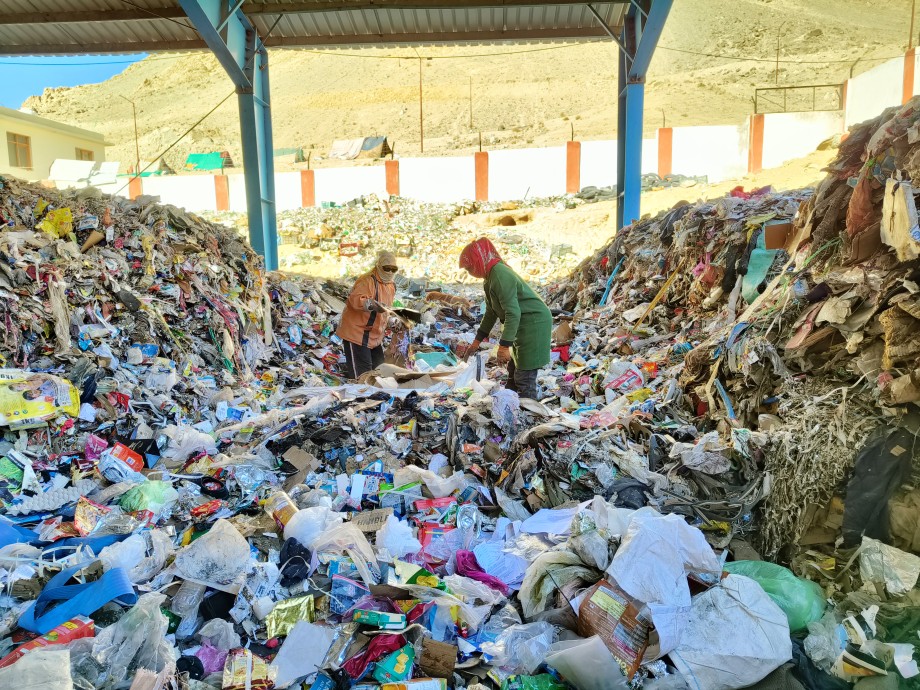Plastic waste to pave roads: Ladakh's new sustainability initiative HUDD Ladakh and Project Himank sign MoU to combat plastic waste in Leh

The growing issue of plastic waste in Ladakh is becoming a pressing environmental concern. The region’s delicate ecosystem is under strain due to unplanned urbanization and increasing tourism, which have significantly escalated waste production. Leh town alone generates approximately 14 to 15 metric tonnes of waste daily, of which 40% is wet waste, and 60% is dry, much of it non-biodegradable plastic.
In a significant move to tackle plastic waste, the Housing & Urban Development Department (HUDD) of Ladakh and Project Himank (BRO) signed a Memorandum of Understanding (MoU) on November 16. The agreement focuses on repurposing plastic waste for road construction, an innovative approach that addresses both environmental and infrastructural needs in the region.
The MoU, valid for three years, was signed at the Himank Headquarters by Sudeep Mishra, Officiating Chief Engineer of Project Himank, and Moses Kunzang, Director of Urban Local Bodies (ULB), representing HUDD Ladakh. This initiative aligns with Ladakh’s broader goals of promoting sustainability while generating economic opportunities for the local community.
The initiative seeks to repurpose non-biodegradable plastic waste, reduce pollution, and create economic opportunities. Highlighting the importance of the MoU, Moses Kunzang stated, “The primary objective of the MoU is to address the plastic waste issue and ensure its scientific disposal. We will shred plastics like Low-Density Polyethylene (LDPE) and High-Density Polyethylene (HDPE) to supply them to BRO, adhering to their specifications.”
Initially, the project will supply 2 metric tonnes of shredded plastic waste, sized 5.2 mm or less, for use in road construction. Additional quantities may be procured based on feedback from the first phase.
Current waste management in Leh
At present, waste generated in Leh town is collected by the Municipal Committee (MC) Leh and transported to the Solid Waste Management Plant located at Skampari, La Sermo. Here, waste is segregated into recyclable and non-recyclable components.
Tsewang Dorjay, Manager of the Solid Waste Segregation Plant, shared insights into the facility’s operations. The plant employs 12 segregation workers, one driver, and one manager. Recyclable materials are sorted and sent to designated recycling facilities both within and outside Ladakh.
However, Dorjay emphasized the importance of community involvement in waste management. “We urge the public to minimize garbage production and segregate waste at the household level. Proper segregation at the source greatly simplifies the process at the plant,” he said.
Impact of the Initiative
This collaboration marks a significant step toward addressing Ladakh’s waste crisis. The initiative not only provides a sustainable solution for managing plastic waste but also strengthens local infrastructure by enhancing road quality. Using plastic in road construction reduces environmental pollution and improves the lifespan and resilience of roads, especially in extreme weather conditions like those in Ladakh.
Moreover, the project aligns with Ladakh’s vision of sustainable development, balancing ecological preservation with economic growth. The integration of waste management with infrastructure development also sets a precedent for other regions to adopt similar innovative approaches.
By turning waste into a resource, this partnership between HUDD Ladakh and Project Himank exemplifies a proactive approach to addressing Ladakh’s environmental challenges while paving the way for a more sustainable future.





